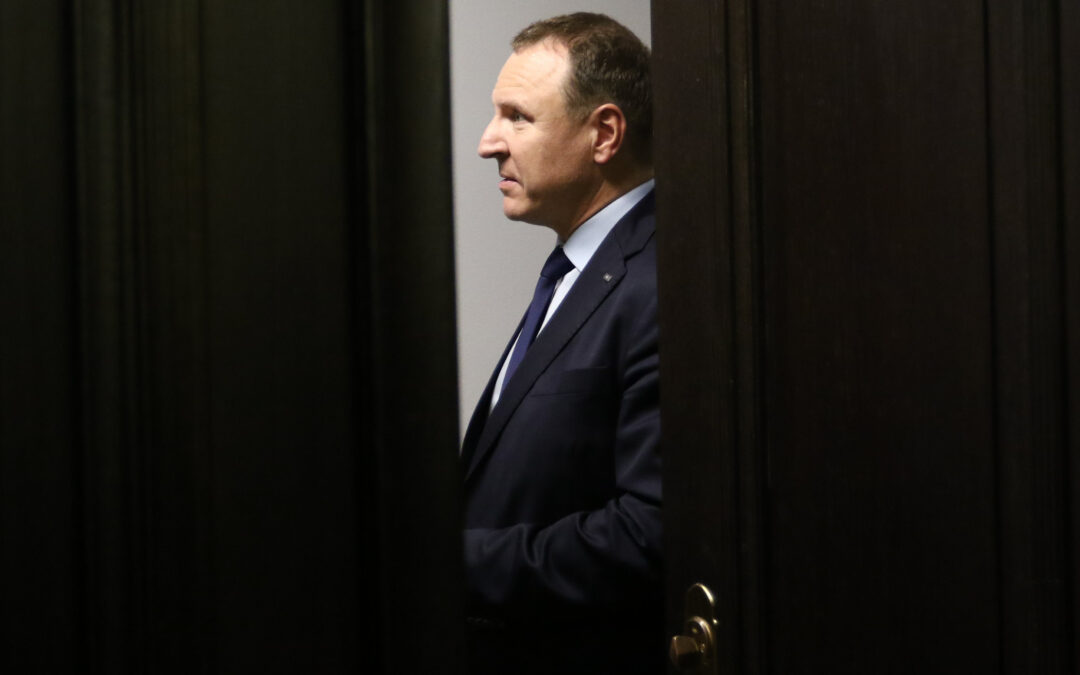Jacek Kurski, the influential head of Poland’s public broadcaster TVP, has unexpectedly been dismissed from his position. Under his leadership since 2016, TVP has become a mouthpiece for the government, in which he previously served as a deputy minister.
The reasons for Kurski’s departure remain unknown, but one leading newspaper suggests that it could be a move designed to pave the way for him to return to government in a prominent position. A ruling party spokesman has confirmed that there are “new tasks” awaiting Kurski.
Shortly after midday today, media reports emerged that the National Media Council (RMN) – a state body that oversees public media – had unanimously voted to dismisse Kurski from his position. It then appointed Mateusz Matyszkowicz, who had previously sat on TVP’s board, to replace him.
Rada Mediów Narodowych odwołała Jacka Kurskiego ze stanowiska prezesa TVP. Na stanowisko powołała Mateusza Matyszkowicza – dowiedział się portal https://t.co/HWi4QrSEi0.#PAPinformacje pic.twitter.com/IKNucT0J7N
— PAP (@PAPinformacje) September 5, 2022
The motion to dismiss Kurski was submitted by the RMN’s chairman, Krzysztof Czabański, who hails from the ruling national-conservative Law and Justice (PiS) party.
Another member of the RMN, Robert Kwiatkowski from The Left (Lewica), an opposition party, complained in a tweet that there had been no opportunity for a competitive hiring process to choose a replacement for Kurski.
He voted against Matyszkowicz’s appointment, while the other opposition representative on the council, Marek Rutka, reportedly abstained. The three PiS-appointed members voted in favour.
RMN właśnie odwołała Jacka Kurskiego z funkcji prezesa TVP i powołała M Matyszkowicza. Niestety bez szansy na konkurs.
— Robert Kwiatkowski (@KwiatkowskiRob) September 5, 2022
Kurski’s dismissal – which came without any kind of forewarning – immediately set off speculation as to why such an influential figure – whose station is seen as a vital tool for the government ahead of next year’s vital parliamentary elections – had been removed.
Rzeczpospolita, a leading centre-right daily, wrote that it had learnt from government sources that “talks took place a few days ago on Jacek Kurski’s move to the government”.
“Politicians are surprised by the information about the dismissal of the head of TVP, but they do not rule out that events may have accelerated and Kurski may enter the government ‘in place of someone more than a minister’,” reports the newspaper.
Soon after, Radosław Fogiel, a PiS spokesman, tweeted that Kurski’s dismissal “of course does not mean a negative assessment of his work”. Instead, there “will soon be new tasks ahead of Kurski”, Fogiel added.
Zmiana na stanowisku prezesa TVP nie oznacza oczywiście negatywnej oceny dotychczasowej pracy. Już niedługo przed @KurskiPL nowe zadania.
— Radosław Fogiel (@radekfogiel) September 5, 2022
Kurski – a former member of Poland’s underground anti-communist opposition – after 1989 became a right-wing politician. He served as an MP and MEP for PiS and United Poland (Solidarna Polska), two of the parties that make up the current ruling coalition.
In November 2015 he became a deputy culture minister in the new PiS-led government. But soon after, in January 2016, he left that role to become head of TVP.
In March 2020, Kurski was dismissed from that position, reportedly on the demand of President Andrzej Duda. However, he remained at the station as an advisor and then resumed his position as CEO in August the same year.
While Poland’s public broadcasters have always been under the influence of whichever parties are in power, under Kurski’s rule TVP has been politicised to an extent unprecedented in the post-communist period. Its programming, including news broadcasts, promote the government’s line and attack its opponents.
Public trust in the station has fallen to its lowest ever recorded level since the end of communism and Poland has fallen from its highest ever position in the World Press Freedom Index when PiS came to power to its lowest one.
Reporters Without Borders, which compiles the ranking, notes that state-owned media have been purged of dissenting employees and “transformed into government propaganda mouthpieces”.
Following the 2020 presidential election campaign – during which TVP news broadcasts accused the opposition candidate of working on behalf of a “powerful foreign lobby” and of seeking to “fulfil Jewish demands” – OSCE observers noted that the station’s “biased, xenophobic and antisemitic” reporting had “undermined voters’ ability to make an informed choice…[and] amplified the advantage of the ruling party”.
Supporters of the ruling party, however, argue that TVP’s position is a necessary balance in a media landscape that was previously dominated by liberal- and left-leaning media outlets that were hostile towards PiS.
Last year, Kurski declared that it was TVP’s role to protect Poland from a “neo-Bolshevik onslaught” and “defend the moral order”. Earlier this year he claimed that a plan is being implemented with external support to overthrow the Polish government.
Main image credit: Slawomir Kaminski / Agencja Gazeta

Daniel Tilles is editor-in-chief of Notes from Poland. He has written on Polish affairs for a wide range of publications, including Foreign Policy, POLITICO Europe, EUobserver and Dziennik Gazeta Prawna.




















